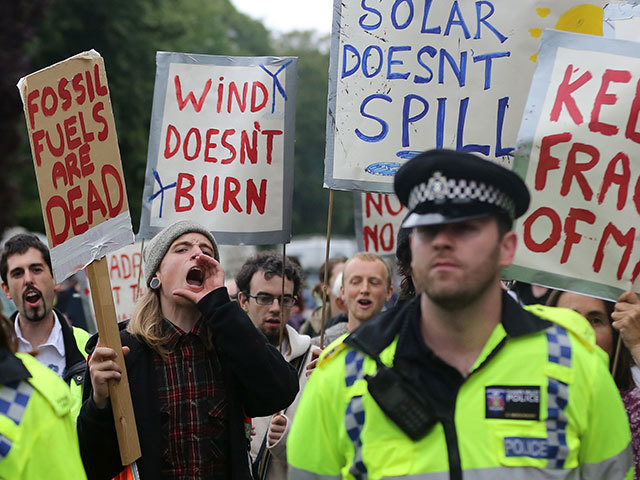
Ministers have been accused of bribing communities into accepting fracking under their land.
Energy Minister Michael Fallon announced proposals which would see voluntary payments of £20,000 per well.
The compensation would be distributed after consultation with local community groups, and would be in addition to one-off £100,000 payments in areas with fracking sites and a 1% share of profits made.
But Greenpeace declared that the “bungs and bulldozers approach” has caused a drop in support for the controversial process.
The government proposals also feature new rules to simplify the granting of access for fracking.
They would see underground access for shale oil and gas developments allowed under 300 metres, which Mr Fallon claimed was deep enough to have “no negative impact on land owners or home owners”.
The consultation was released alongside a report by the British Geological Survey (BGS) which found there are an estimated 4.4 billion barrels of shale oil in vast parts of southern England.
The study of the Weald Basin, which stretches from Wiltshire to Kent, found there could be 2.2-8.5 billion barrels of shale oil.
The BGS stressed that these numbers are for resources and not reserves. Shale oil exploration in the United States has only been able to access up to 10% of the total oil.
By comparison with the Weald Basin figures, around 40 billion barrels of oil have already been extracted from the North Sea.
The study also found there is unlikely to be any shale gas potential in the area.
Robert Gatliff, director of energy and marine geoscience at the BGS, said: “It’s not a huge bonanza. But we have to see what happens and we won’t really know the answers until we have got some more drilling and testing.”
When asked if the findings were a let-down for the Government, Energy Minister Michael Fallon replied: “It’s not a let-down or a let-up. It is what it is.
“It’s a potentially home-grown source of energy that we simply cannot afford to ignore. That is why we’re encouraging this development through streamlining and simplifying the regulatory process while protecting the environment.”
He went on: “We are keen for shale and geothermal exploration to go ahead while protecting residents through the robust regulation that is in place.
“These proposals allow shale and geothermal development while offering a fair deal for communities in return for underground access at depths so deep they will have no negative impact on landowners.”
When asked why the government was promoting the use of a fossil fuel, Mr Fallon said: “There’s nothing particularly green about tankering oil all the way across the world from the coast of Africa or from Russia if we have it here.”
Ministers firmly back the exploitation of shale gas reserves in rocks beneath the UK, claiming it could bring down energy bills and create thousands of jobs.
Environmental activists are bitterly opposed to the technique, which opponents say can increase climate change, cause small earthquakes and pollute water supplies.
Prime Minister David Cameron has insisted that fracking will be “good for our country” and has blamed a “lack of understanding” of the process for some of the opposition.
But Greenpeace UK energy campaigner Lawrence Carter said: “Stripping away people’s property rights while trying to kick off a Klondike-style shale oil rush in the Home Counties is a highly toxic policy mix.
“The Tories have just taken a bruising at the local elections – fracking will only make things worse for Tory MPs in the party’s heartlands at next year’s vote.”
He added: “Dangling larger bribes in front of communities won’t quell their deep concerns about fracking. People know very well you can’t put a price on clean air and water, unspoilt countryside, and a stable climate.
“Falling support for fracking shows the bungs and bulldozers approach isn’t working. Ministers should look at more practical solutions to boost our energy security, like slashing waste and promoting clean renewable energy sources.”
Sir Merrick Cockell, chairman of the Local Government Association (LGA), said: “Given the significant tax breaks being proposed to drive forward the development of shale gas and the likely returns, payments to communities should be more in line with those across the rest of the world and be set at between five and 10% of revenues.
“We also want to see community benefits of fracking enshrined in law, so companies cannot withdraw them to the detriment of local people. The LGA is encouraging the development of models which will ensure the money would go into a charitable fund for community purposes and used to support local priorities.”
The consultation launched today will be open for 12 weeks and the Government will announce further steps once feedback has been considered.
